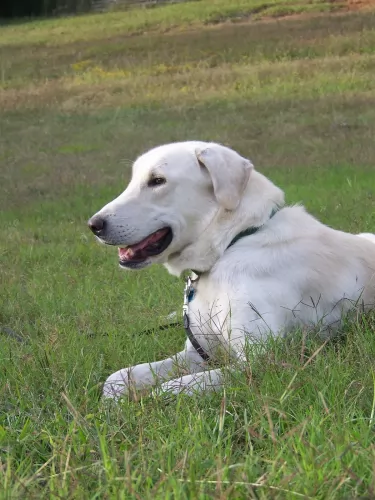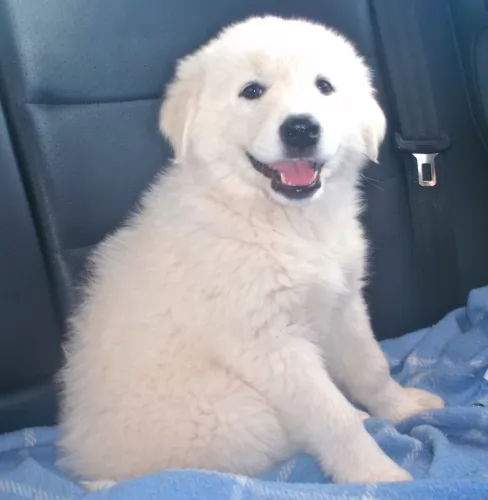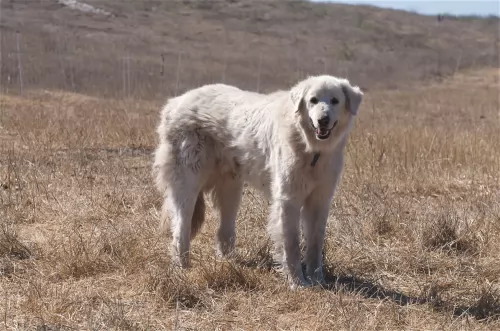 Petzlover
PetzloverAkbash Dog is originated from Turkey but Bullenbeisser is originated from Germany. Akbash Dog may grow 20 cm / 8 inches higher than Bullenbeisser. Akbash Dog may weigh 31 kg / 69 pounds more than Bullenbeisser. Both Akbash Dog and Bullenbeisser has almost same life span. Both Akbash Dog and Bullenbeisser has almost same litter size. Akbash Dog requires Moderate Maintenance. But Bullenbeisser requires Low Maintenance
 Akbash breed became popular in the 1970s. Around that period, Akbash was introduced to North America. There is archeological evidence that this breed was popular even in the 750-300 BC. Of course, it wasn’t the exact dog as we know it today, but there are many similarities between Akbash and dog from the ancient period. This breed was developed in Turkey to be a guardian dog. They were perfect flock guardians.
Akbash breed became popular in the 1970s. Around that period, Akbash was introduced to North America. There is archeological evidence that this breed was popular even in the 750-300 BC. Of course, it wasn’t the exact dog as we know it today, but there are many similarities between Akbash and dog from the ancient period. This breed was developed in Turkey to be a guardian dog. They were perfect flock guardians.
Known also as the German Bulldog, the Bullenbeisser was a strong dog which is now unfortunately extinct. There were two regional types – the Brabanter- and the Danziger Bullenbeisser.This Molosser-type dog was native to Germany and was bred for different hunting purposes.
Nobody is quite sure what dogs are included in Molossers, but they are essentially large dogs bred to hunting and rescue, tending to have a shorter muzzle. The Bullenbeisser is famous for the role the dog has played in the development of the wonderful dog we have today, the Boxer. In fact, some Bullenbeissers were crossed by the Boxer Kennel Club of Germany with Bulldogs from the UK.
Not much is known about the history of the Bullenbeisser, but the breed also has a history in the lands of the Holy Roman Empire. The dog was at first a type of Mastiff, large and with the typical brachycephalic head, and used for hunting because of their power.
To improve their dogs, many Bullenbeisser breeders began crossing their dogs with English Bulldogs, introducing a white coat to the Bullenbeisser. Other breeds were also crossed with the dog such as the Bull Terrier, but by the end of the 19th century, the traditional Bullenbeisser was slowly dying out. It was in the late 1870s that German breeders, Hopner, Konig and Roberth used the dog to bring about a new breed, which today is known as the Boxer.
 Weight of the Akbash dog variates from 41-64kg, while their height is 71-78cm. Female Akbash is smaller than a male Akbash, but not for much.
A lifespan of an average Akbash dog is 10-11 years, but if they have cared properly, they tend to live longer.
Litter Size of Akbash is 8-9 puppies.
Another Name for Akbash is Akbas Coban Kopegi, Coban Kopegi.
Weight of the Akbash dog variates from 41-64kg, while their height is 71-78cm. Female Akbash is smaller than a male Akbash, but not for much.
A lifespan of an average Akbash dog is 10-11 years, but if they have cared properly, they tend to live longer.
Litter Size of Akbash is 8-9 puppies.
Another Name for Akbash is Akbas Coban Kopegi, Coban Kopegi.
The Boxers lineage comes from the Bullenbeisser. The Bullenbeisser was a fierce, courageous dog, noted for its hunting abilities. The dog was developed into the Boxer so that its body become more defined and more streamlined.
Described as a medium to large muscular dog, standing roughly 63cm in height, he would have weighed in the region of 32kg. He had a short coat, brown eyes and short to medium ears which were half erect, half floppy.
Brown to fawn in color, he had a long tail which was later docked to give the dog a more distinctive, attractive look. The dog also got its attractive fawn color from the English Bulldog. Loyal, active and loving, the Bullenbeisser was a true family dog with a close affinity to children.
 Have in mind that Akbash is a large and powerful dog. They are bred through generations to be guardians and suspicious. They are very independent because they tend to make their own decisions while guarding flocks. They will require adequate socialization, but overall, they are very intelligent and they tend to learn quickly. It requires time and patience, but are great pets for right owners. Akbash has a white to biscuit color coat. They also have a dark pigment around nose, eyes, and mouth. Akbash is very quick and agile dog, which might be surprised because of its size.
Have in mind that Akbash is a large and powerful dog. They are bred through generations to be guardians and suspicious. They are very independent because they tend to make their own decisions while guarding flocks. They will require adequate socialization, but overall, they are very intelligent and they tend to learn quickly. It requires time and patience, but are great pets for right owners. Akbash has a white to biscuit color coat. They also have a dark pigment around nose, eyes, and mouth. Akbash is very quick and agile dog, which might be surprised because of its size.
It is important to train them since the puppyhood. They are working dogs and they will be happy when they have tasks during training. Due to their independence, consistent and steady training is important. An old-fashioned way of training that includes punishment is not recommendable. Positive training with awards is the best way to train your Akbash dog. They do not require a lot of daily exercises. Daily walks would do more than enough. Younger dogs need more exercise than more mature ones. They can be very good for other animals, but they have to be socialized with them. It is the best way to socialize your dog when it is still a puppy.
Information on the extinct Bullenbeisser is limited, but because he was used to bring about the Boxer you can be sure that he would have been fearless, courageous and territorial of his property and of his human family.
The Bullenbeisser would have been a good watch-dog and with the right kind of loving care, a most awesome and loving family companion.
In general, medium to large breeds like the Bullenbeisser have a lifespan of 10, 11 or 12 years. The life expectancy of these dogs relied much on the lifestyle they led and their diets.
The Bullenbeisser had a deep chest and this made dogs like this prone to gastric dilatation and bloat which can be life-threatening and which requires immediate veterinary intervention. The dog with this disease has distension of the abdomen and extreme discomfort, wanting to vomit but being unable to do so.
Hip Dysplasia is a disease which is more common in larger dogs and is an abnormal formation of the hip socket, resulting in lameness accompanied by painful arthritis.
 Akbash dog is very easy to care. They can stay fit on a minimum amount of food. 2-2.5 cups divided into two meals would be ideal for your dog. They require meat, so giving them dry industrial food can be a solid substitute. Vegetables and oil can also be included in meals. It will keep your dog healthy and happy.
Akbash dog is very easy to care. They can stay fit on a minimum amount of food. 2-2.5 cups divided into two meals would be ideal for your dog. They require meat, so giving them dry industrial food can be a solid substitute. Vegetables and oil can also be included in meals. It will keep your dog healthy and happy.
Puppies have to eat more meals per day. It is the best to give your puppy Akbash 3-5 meals per day. Those meals should be divided into smaller portions. It is recommended to give your puppy all necessary vitamins and minerals that include calcium for stronger bones. It will improve the overall health of your dog, and it will help it develop into a healthy adult dog.
Akbash will request some grooming, but they are not very difficult to groom. They require regular grooming. Every few days will be enough, except when they are shedding. Akbash will need daily grooming when shed. You can bath your pet occasionally, but not very often. Bathing, if necessary, should be done only 5-6 times a year. There is no need for more.
The Bullenbeisser was a mastiff like breed with a short, easy-to-care for coat. He would have required a good brushing down at least twice a week to remove the coat from loose hairs. As an active, outdoor-type dog, he would have had to have his ears checked for dirt and the possibility of infection.
Although the Bullenbeisser was a hunting dog, he no doubt led an active outdoor lifestyle. Dogs such as the Boxer and the Mastiff, which are descendants of this dog are the kind of dogs which will need to be exercised regularly, taken on walks and given lots of running games with a ball.
As a medium to larger breed with lots of energy, the Bullenbeisser would have no doubt had home-made food from his master’s table. This food would have included meat and vegetables. As a hunting dog he would have had the chance to get in some raw meat which is imperative for the health of any domesticated dog today.